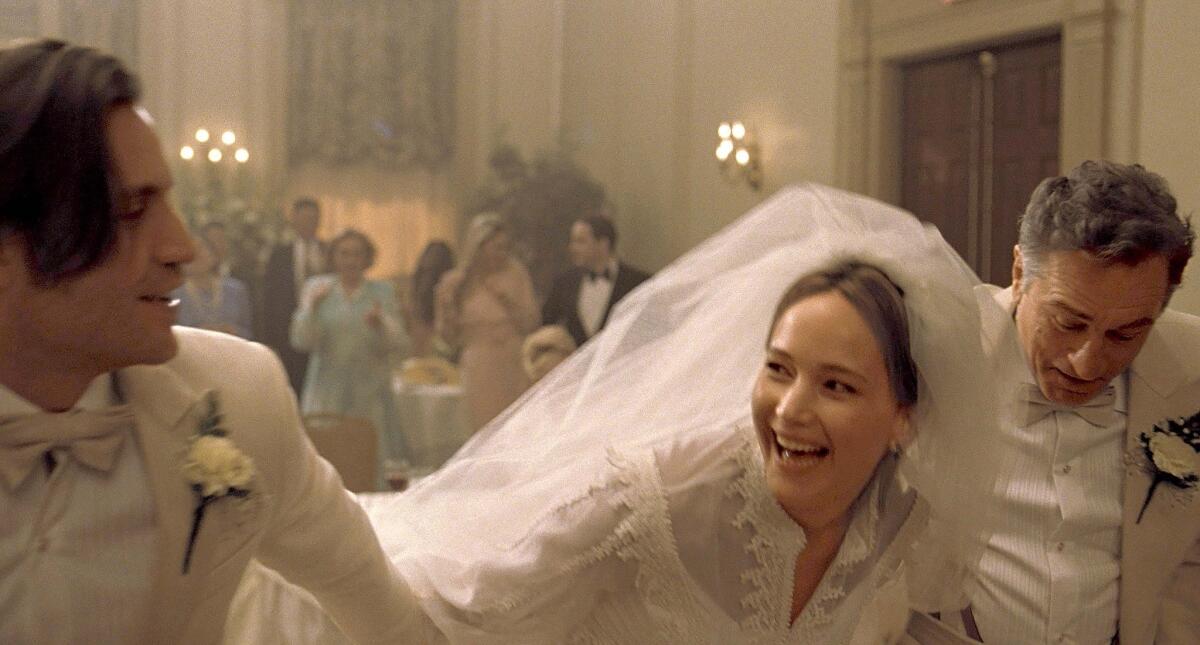Gold Standard: Oscar Watch: ‘Joy’ belongs to Jennifer Lawrence
- Share via
Oscar Watch, charting the smiles, the frowns, the ups and downs of the awards season, comes to you every Monday from now through the end of February.

Edgar Ramirez, Jennifer Lawrence and Robert De Niro in “Joy.”
'Joy' unveiled for critics, awards voters
"Joy," the third collaboration between filmmaker David O. Russell and actress Jennifer Lawrence, had its first public screenings over the weekend. The movie follows the title character, a young woman (Lawrence, who else?) overcoming numerous obstacles (mostly her family) to realize her dreams as an entrepreneur.
At a Q&A Saturday, Lawrence called "Joy" a tribute to "women who are the unsung heroes of their households."
Russell noted it's his first movie centered on a female protagonist and the first time Lawrence is playing a character "who's not crazy" for him.
It will also likely be the first Russell movie in his recent run of awards-season success -- "The Fighter," "Silver Linings Playbook" and "American Hustle" -- to not win multiple Oscar acting nominations for members of its ensemble. This is very much Lawrence's movie.
"We got to do her dreams and nightmares, got to show her before success and after success, got to show her romance after it ebbed," Russell said at the Q&A. "And we got to go into a dream life we never did before."
Russell regulars Bradley Cooper and Robert De Niro have small roles. Cooper, playing a QVC executive who helps Joy, pops more than De Niro, cast as Joy's feckless father. The ensemble also includes Edgar Ramirez (Joy's ex-husband, singing a mean "Waters of March"), Diane Ladd (Joy's grandmother), Virginia Madsen (Joy's mother), Dascha Polanco (Joy's best friend) and Isabella Rossellini (Joy's financial backer).
But the supporting players' screen time is limited and, in some cases, the characters aren't particularly well-developed. And they all revolve around Joy.
The movie played fairly well with voters at the weekend screenings with the audiences applauding and wincing in all the right places. But it felt short of a home run. As one academy member noted: "It seemed scattered. Then I saw there were four editors listed in the credits. That made sense." (A review embargo prevents me from delving in deeper at the moment.)
Russell's recent films have enjoyed an upward trajectory with the academy -- "The Fighter" won seven nominations, "Silver Linings" eight and "American Hustle" 10. With only Lawrence a strong bet among its actors, "Joy" probably won't continue that progression.
But Russell's commitment to his title character does give "Joy" a sturdy platform in a year that has seen much discussion about gender disparity in Hollywood. "Joy's" journey will resonate with any woman who has dealt with condescending, dismissive attitudes while fighting for basic equality. Problem is, the film academy is 76% male. Their reactions will be a key to the movie's Oscars prospects.

Alicia Vikander as Gerda Wegener in Tom Hooper’s “The Danish Girl.”
Category fraud outrage
Remember the hand-wringing when the Hollywood Foreign Press Assn. placed Ridley Scott's space survival story "The Martian" in the comedy categories for this year's Golden Globes?
What if I told you that "The Martian" is funnier than "Joy," another Fox movie that, per the studio's wishes, will compete as a comedy at the Globes? Would that assuage your anger? No? What if I showed you this? Does that help?
This has been the year of CATEGORY FRAUD with Oscar bloggers rending their garments about dramas being labeled comedies, lead actors being campaigned in supporting categories, human sacrifice, dogs and cats living together ... you know the drill.
One idea floated: A uniform standard that would designate anyone appearing in 50% or more of a film's running time as a lead and actors appearing in less than 50% as supporting.
Sounds reasonable ... until you think about, say, Anthony Hopkins in "The Silence of the Lambs" or Marlon Brando in "The Godfather," two lead actor Oscar winners who spent less than a quarter of their films' running time on-screen. Other lead actor winners who appeared in less than 50%: Michael Douglas in "Wall Street," Peter Finch in "Network," Sean Penn in "Mystic River," Alec Guinness in "The Bridge Over the River Kwai" and ... well ... it's a long list. And that's just the actors.
Bottom line: You can't force art into boxes. Just as a studio can't compel the academy to vote for an actor in a category simply because it campaigns them there. If Oscar voters don't believe Rooney Mara ("Carol") or Alicia Vikander ("The Danish Girl," picture) belong in supporting, they'll put them in lead, just like they did with Kate Winslet ("The Reader") or Susan Sarandon ("Atlantic City") or Keisha Castle-Hughes ("Whale Rider").
Email: [email protected] | Twitter: @glennwhipp
From the Oscars to the Emmys.
Get the Envelope newsletter for exclusive awards season coverage, behind-the-scenes stories from the Envelope podcast and columnist Glenn Whipp’s must-read analysis.
You may occasionally receive promotional content from the Los Angeles Times.








